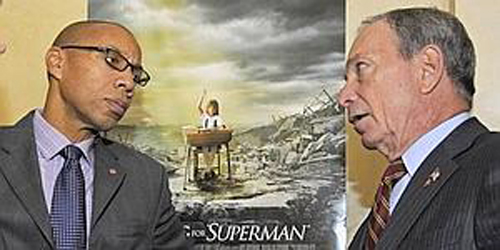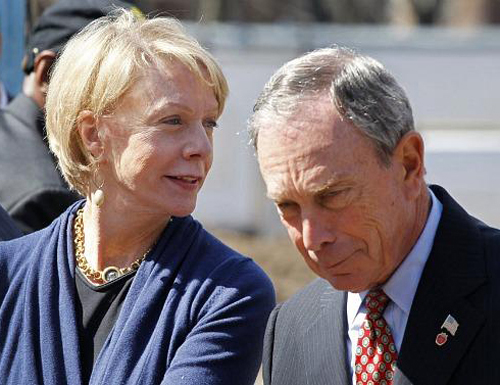MEDIA WATCH: Poll shows New Yorkers skeptical of mayoral control
[Editor's Note: In the following article, published September 6, 2011 in The New York Times, a recent poll shows that only one-third of those responding consider that New York Mayor Michael Bloomberg's handling of education is satisfactory. Mayoral control has been failing across the USA for nearly 20 years, but corporate media continue to shift narratives whenever the bad news comes out (again). When Bloomberg took over the New York City schools in 2002, the national mythmakers quickly shifted all of their coverage of the "success" of mayor control from Chicago to New York. As late as 1999, Chicago was the favored focus of those who touted mayor control as the solution to urban school problems. Neoliberals across the USA, in both the Republican and Democratic parties, were cheering on mayoral control, and many so-called "progressives" were making money off it. Bill Clinton, In two State of the Union messages, President Bill Clinton cited the Chicago miracle, but by the turn of the century, Chicago was already tainted with corruption, Paul Vallas was heading out of town, and the national ruling class shifted its focus to another large city where the value of the mayoral control model of corporate "school reform" could be proved. Now, like Chicago, New York has failed under mayoral control].
New Yorkers Say Mayor Has Not Improved Schools. By SHARON OTTERMAN and ALLISON KOPICKI
Published: September 6, 2011
The URL for those who can't access the hotlink is: http://www.nytimes.com/2011/09/07/education/07poll.html?_r=1&ref=nyregion
New Yorkers are broadly dissatisfied with the quality of their public schools, and most say the city’s school system has stagnated or declined since Mayor Michael R. Bloomberg took control of it nine years ago, according to a New York Times poll.
 In September 2010, New York Mayor Michael Bloomberg (right above) told the media that he had been very moved by the propaganda film "Waiting for Superman." At the time, Bloomberg posed with an aide, Dennis Walcott. After the debacle of the appointment of Cathy Black to serve as Chancellor of the New York City public schools, Bloomberg put Walcott in charge. Walcott's servile loyalty to Bloomberg continues the corrupt traditions of executive control over public schools, but recent polls show that the mayors' popularity is declining, not only in New York. Mr. Bloomberg has made improving the schools a focus of his mayoralty, seizing authority over the bureaucracy, doubling the budget and opening hundreds of additional, small schools. Still, even as his overall approval rating, 45 percent, is at a six-year low, considerably fewer residents — 34 percent — approve of how the mayor is handling education.
In September 2010, New York Mayor Michael Bloomberg (right above) told the media that he had been very moved by the propaganda film "Waiting for Superman." At the time, Bloomberg posed with an aide, Dennis Walcott. After the debacle of the appointment of Cathy Black to serve as Chancellor of the New York City public schools, Bloomberg put Walcott in charge. Walcott's servile loyalty to Bloomberg continues the corrupt traditions of executive control over public schools, but recent polls show that the mayors' popularity is declining, not only in New York. Mr. Bloomberg has made improving the schools a focus of his mayoralty, seizing authority over the bureaucracy, doubling the budget and opening hundreds of additional, small schools. Still, even as his overall approval rating, 45 percent, is at a six-year low, considerably fewer residents — 34 percent — approve of how the mayor is handling education.
“What had been a signature issue for Bloomberg may not be the legacy issue he hoped it would be,” said Bruce M. Gyory, a political consultant and adjunct professor at the State University of New York at Albany.
In follow-up interviews, poll respondents expressed various reasons for their dissatisfaction, including frustration over the system of school choice, services for disabled children and the emphasis on standardized tests.
“Bloomberg treats the schools and the education system like a business,” said Liette Pedraza-Tucker, 41, a film editor from Brooklyn. “But schools aren’t a business. Kids need nurturing, not to be treated like adults.”
Robert Kemp, 74, a retired bank officer from Queen s, said: “What they’re teaching is too narrowly focused. It’s all let’s pass tests; it’s not about turning out educated kids.”
 New York publishing executive Cathy Black (above) lasted less than six months as Chancellor of the New York City public schools. Her appointment by Mayor Michael Bloomberg was widely viewed as a proof on Bloomberg's part that he could put anyone he wanted into power. City Hall played down the results. “The numbers we are focused on are the gains our students are making in the classroom, and by those measures, we have made historic progress,” said Julie Wood, a mayoral spokeswoman. “Graduation rates are at an all-time high and we are outpacing the rest of the state on test scores. But we have to keep raising the bar.”
New York publishing executive Cathy Black (above) lasted less than six months as Chancellor of the New York City public schools. Her appointment by Mayor Michael Bloomberg was widely viewed as a proof on Bloomberg's part that he could put anyone he wanted into power. City Hall played down the results. “The numbers we are focused on are the gains our students are making in the classroom, and by those measures, we have made historic progress,” said Julie Wood, a mayoral spokeswoman. “Graduation rates are at an all-time high and we are outpacing the rest of the state on test scores. But we have to keep raising the bar.”
The poll was conducted Aug. 9 to 15, with telephone interviews of 1,027 adults throughout New York City. Of respondents, 287 identified themselves as parents, and 167 said they were parents of a child in public school. The margin of sampling error is plus or minus three percentage points for all adults, plus or minus six percentage points for all parents and plus or minus eight percentage points for public school parents.
Dissatisfaction with public schools in New York is longstanding. Through much of the 1990s, as well as in Mr. Bloomberg’s first years in office, few residents were satisfied, past New York Times/CBS News polls found.
As Mr. Bloomberg reorganized the system and poured money into it, satisfaction slowly grew. It appeared to peak in 2009, when nearly one-third of registered voters said they were satisfied with the schools, and 57 percent with Mr. Bloomberg’s handling of them, according to Quinnipiac University polls.
 Magazine publisher Cathy Black and New York Mayor Michael Bloomberg during happier days. Bloomberg was forced to accept her resignation as Chancellor of New York's public schools in April 2011.But in 2010, a recalibrating of state test scores sent the city’s soaring passing rates nearly back to 2003 levels. Then Mr. Bloomberg made what the public may have judged as his biggest gaffe, naming Cathleen P. Black, a publishing executive with no education experience, as the schools chancellor. Even though Ms. Black was dismissed in April after three months, the effects on public opinion linge r, analysts said. Fewer people today approve of Mr. Bloomberg’s handling of education now than in his first years as mayor.
Magazine publisher Cathy Black and New York Mayor Michael Bloomberg during happier days. Bloomberg was forced to accept her resignation as Chancellor of New York's public schools in April 2011.But in 2010, a recalibrating of state test scores sent the city’s soaring passing rates nearly back to 2003 levels. Then Mr. Bloomberg made what the public may have judged as his biggest gaffe, naming Cathleen P. Black, a publishing executive with no education experience, as the schools chancellor. Even though Ms. Black was dismissed in April after three months, the effects on public opinion linge r, analysts said. Fewer people today approve of Mr. Bloomberg’s handling of education now than in his first years as mayor.
And Dennis M. Walcott, the longtime deputy mayor who replaced Ms. Black as chancellor, has not yet made a strong impression, with 53 percent of those polled having no opinion on his performance.
A year of political attacks on teachers and their unions nationally appeared not to have registered with New Yorkers. A quarter said they had a favorable opinion of the local teachers’ union, compared with 16 percent who had an unfavorable opinion. A majority did not express an opinion.
Among parents, 34 percent volunteered that teachers were the best thing about their child’s school, more than in 2004, when 22 percent said so. A plurality of parents said teacher quality was the most important thing to look at when choosing a school.
Crowding and class sizes, which are growing, ranked high est when parents were asked to name the worst thing about their schools, at 13 percent. It is an issue frequently mentioned by the teachers’ union and parents, but not City Hall.
New Yorkers are pleased with some of Mr. Bloomberg’s initiatives: 56 percent, for example, said charter schools, which have expanded under the mayor, were a good idea. Fewer than half, however, favor having charters share buildings with traditional public schools, a situation that is increasingly common and contentious.
Public school parents also appreciated Mr. Bloomberg’s emphasis on school choice, with 67 percent saying they were satisfied with their choice of schools, compared with 51 percent in 2004.
“Maybe things aren’t perfect, but they are moving in the right direction,” said Takeisha Hall-Ruff, a Bronx resident whose 8-year-old is in a gifted and talented program and who approved of the mayor’s handling of education. “Schools are being evaluated, they are more accountable.”
Ms. Wood, the mayoral spokeswoman, said: “We are working to build a system of great schools and put a great teacher in every classroom. Parents have made clear that is what they want for their children, and today they are more satisfied with their choices of schools.”
Over all, New Yorkers are split on whether Mr. Bloomberg has made the schools better than he found them. Forty percent over all, and 43 percent of the public school parents, said the schools were about the same as nine years ago. Twenty-four percent of all r espondents said schools were better, and 27 percent said they were worse; among public school parents, 29 percent said they were better, and 25 percent said they were worse.
About 6 in 10 people are dissatisfied with the schools’ quality. Satisfaction is higher among public school parents, at nearly 4 in 10, compared with almost 3 in 10 of all residents. A larger percentage of nonparents than parents said they did not know enough to answer the question.
The poll gave hints as to where Mr. Bloomberg needs to focus to improve his standing. Blacks and Hispanics, whose children make up 70 percent of the enrollment in public schools, expressed the most dissatisfaction, with 64 percent of blacks and 57 percent of Hispanics saying they are generally not satisfied, compared with 50 percent of whites.
“Some people wind up in better schools than others, and it continues to break down by race and class,” Joseph P. Viteritti, a professor of public policy at Hunter College, noted. “And the learning gap between minorities and whites is there, and it’s like that in every city across the country.”

